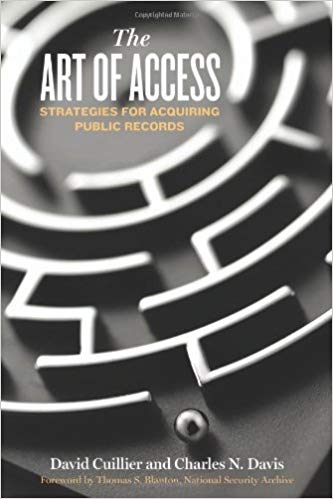Starting late last year I used to submit a Freedom of information act request a day. But alas, my priorities changed for a couple of months and I went into a drought. I enjoy writing FOIAs and pouring over documents and wanted to return to form. To get me requesting records again, I read The Art Of Access: Strategies For Acquiring Public Records and found it be inspiring enough for me to get out of my FOIA funk and back into my FOIA groove.

If you’re new to public records requests, there’s a lot in The Art of Access to help get you started, and it reads in a great, procedural fashion to help you identify records, write requests, appeal, and write articles. It also does a good job highlighting records based reporting over the years.
Even though I’ve been requesting records through FOIA for over a year, I still found plenty of useful information.
The big takeaway from reading this book is that I should be listening for words or phrases from public bodies, and have those be triggers for possible records request. These words include: retreats, attorney-client privilege, executive sessions, and work meetings. I confess I’m not up to date on the nuances of the public meetings act, but the book really encourages records requestors to press on and keep digging when these phrases are used.
The second big takeaway for me is the concept of interviewing documents. When I picture this in my head, I think about putting the document in a chair and I interview it in a dimly lit room, until the document breaks and spills its secrets. The book has 20 questions for you to interrogate your records, and I think I’m going to add this inquisition to my records requests to help me become a better requestor.
In many ways, I think this concept should apply not just to records from a government agency, but any document. At work, when I do discovery for customers, I’m often deluged with documentation from the customer. My job is to suss out the documentation and make sense out of it. I feel that if I want to be more effective at doing this discovery, I should interrogate my documents.
When it comes to interrogating documents, lot of my requests are similar in nature. Typically I pick a topic or type of record, and request them from multiple agencies. My rationale for doing so is it allows me to effectively manage my own workload and easily rewrite requests. I find that by doing this when I do go through the documents from an agency, I have documents from “peers” if you will that I can assess and compare against. Art of Access has encouraged me to diversify my workload, and to press harder for documents beyond the original scoped request.
One thing I struggle with on FOIA is the debate around obtaining personal records as opposed to government records. There’s certainly merited cases where using FOIA on a person may make sense, but that is not the intent of the law. The book glosses over this, and although it doesn’t explicitly say it’s against these requests, it advocates that it is ok. While the book talks about FERPA – something I was surprised to learn about – I feel skipping discussing the potential abuse of FOIA is an unfortunate omission. But I am cognizant that personal records can be pure FOIA fodder. Like the book suggests, I’ve requested my grandpa’s FBI file. There was nothing in it, but if there was, it’d make for a great Thanksgiving conversation.
Though the book is four years old, several things in the book feel dated. First, there is an early reference to Donald Trump that has not aged well, and I’m certain it will be removed in future editions of the book. Second, while I enjoy the book’s conviction to get journalists and activists to use databases, it doesn’t really have much to say on the matter. Data reporting is hard. I wanted to do a lot around machine learning on some FOIA records, but I ran into obstacles out the gate – namely time and money (Azure machine learning is not cheap!). I wish the book said that while these tools are great and are becoming more accessible, the learning curve can be steep for folks who are not data scientists.
Since reading The Art of Access, I’ve submitted about a dozen FOIA requests. It feels good to be back in the records request game, and I hope I can keep it up. Now if only someone can inspire me to go to the gym again.
